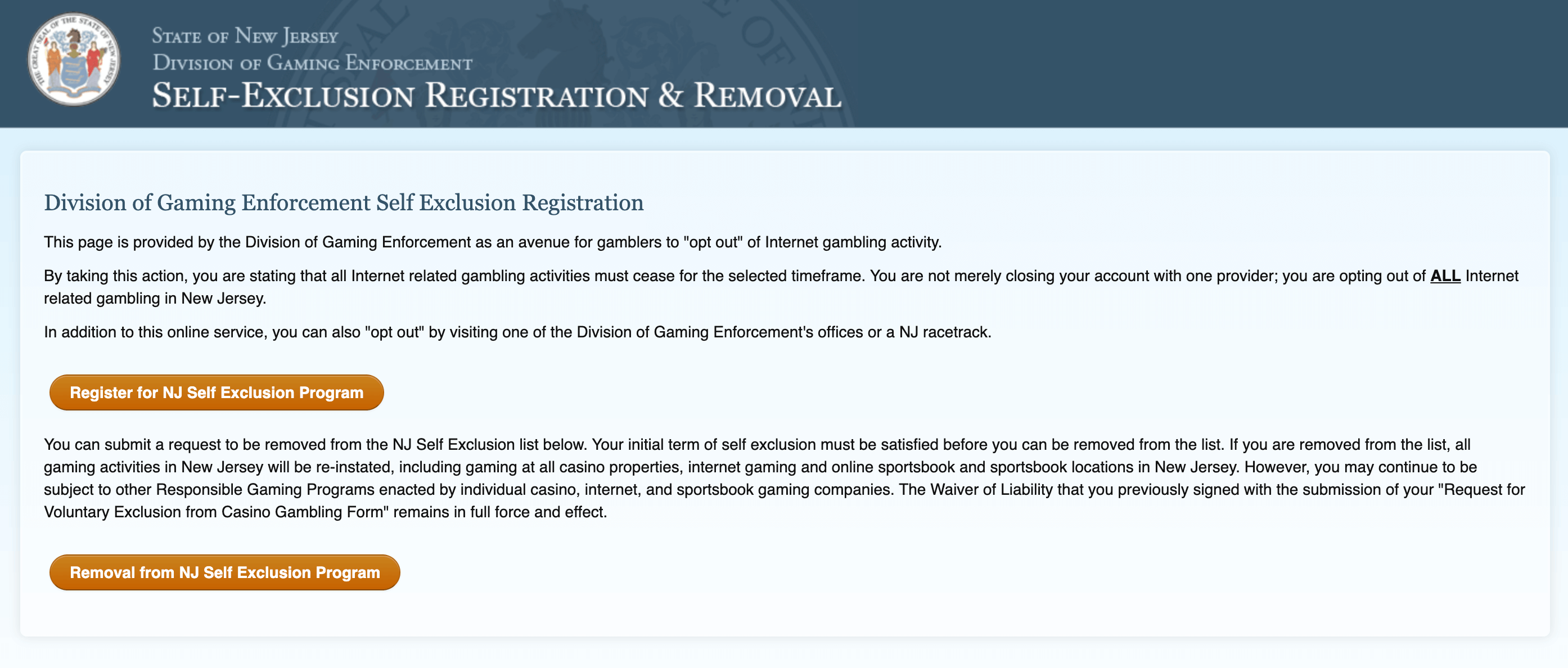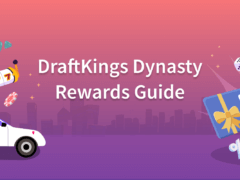Join our subscription list to get access to new bonus offers, online casino reviews, and industry news all in one newsletter!
How Casino Self-Exclusion Works in New Jersey: 2026 Guide

 8.7K
8.7K
As the gambling industry reaches new heights in the Garden State, responsible gambling becomes an even more sensitive but important subject. It goes without saying that casino operators in New Jersey have a duty of care to their customers. Under no circumstances should they permit vulnerable people to gamble and potentially come to harm.
But at the same time, casinos can’t be too authoritarian in a country that prizes freedom so highly. What gives them the right to tell a fully-grown adult what they can and cannot do with their hard-earned cash?
For the most part, gambling companies around the world have done an adequate job when managing this delicate balance over the years. While there’s definitely room to improve existing social responsibility measures, one of the most successful developments has undoubtedly been the concept of voluntary self-exclusion.
How Self-Exclusion Works in the US
So let’s talk about the actual mechanics of self-exclusion in the United States. There are plenty of nationwide resources to help you if you’re struggling, such as the National Problem Gambling Helpline (1-800-522-4700). But in truth, it’s not really possible to effectively implement self-exclusion across 50 different states.
Imagine, for instance, a nationwide land-based casino self-exclusion program. Even if the various local governments could somehow coordinate successfully to put legislation in place, how would it work in practice? Can staff members in brick-and-mortar casinos around Atlantic City possibly memorize the faces and details of every self-excluded player from Texas, California or Florida?
Even if standardized membership cards, digital identities or other technologies were brought in to assist, the system would simply be too big to police. It wouldn’t be difficult for relatives to access venues posing as one another, for instance. What’s more, the issue of fake IDs has been a challenge forever. So in practice, self-exclusion schemes have to run at state level.
NJ Self-Exclusion
The way NJ gambling self-exclusion programs work is quite straightforward. First of all, it’s possible to speak to an individual operator, such as FanDuel or BetMGM, to request exclusion. While that’s effective at keeping you from gambling with that company, nothing prevents you from simply opening an account with another firm.
A much more effective approach is to speak directly to the local government, where you have several options. The New Jersey Casino Gambling Self-Exclusion Program[1] covers both land-based and internet gambling. In order to block yourself from all bricks-and-mortar sites in the region, a visit to the New Jersey Division of Gaming Enforcement in Atlantic City is required. There you’ll need to submit a completed application form from the NJ.gov website.
Alternatively, you can take a trip to the offices of the New Jersey Racing Commission to hand over the form. Either way, you’ll also need to show valid identification and have a photograph taken on the premises for your records.
When requesting land-based exclusion, you can choose from three options:
- A one year period of exclusion;
- Five years of self-exclusion;
- A lifetime ban.
NJ Online Casino Self-Exclusion

As previously stated, the New Jersey Casino Gambling Self-Exclusion Program also covers online gambling sites, including sportsbook services. But if you are only concerned about your wagering on the internet, there are specific online gambling self-exclusion programs in NJ too.
First of all, when visiting the DGE or NJRC offices to submit your form, you can specify online only exclusion. If you’re not down for making the trip in person though, it’s possible to request online exclusion via the DGE website. You’ll need to complete a registration form found at the self-exclusion portal, but this is a much more convenient choice.
The online self-exclusion form requests details including your Social Security Number, home address and date of birth. This information will be kept secure and is purely used to prevent you from creating new online gambling accounts.
Those intending to enroll in a self-exclusion program may also take a Self-Exclusion Problem Gambling Quiz with 20 questions prepared by Gamblers Anonymous, an organization supporting compulsive gamblers since 1957. This quiz helps determine whether an individual is a compulsive gambler with the typical indication of gambling problems being “yes” answers given to at least seven of the questions.
Finally, it’s important to underline that, while the NJ DGE will do its best to implement your self-exclusion, it is not infallible. Ultimately, for such a program to work, the individual has to take responsibility. As such, the DGE is not liable for any losses as a result of players deliberately circumventing their own exclusion. This also applies to individual casinos, both online and land-based.
How to Get Off Self-Exclusion List in NJ
The good thing about NJ self-exclusion is that it’s irreversible. Once you submit that request, you cannot turn back. No matter how hard you plead, there’s no way around it while you remain within the period of self-exclusion. And for such a program to be successful, it is absolutely crucial that its operators continue to enforce this.
You can reverse the effects of a one year or five year exclusion, but only after waiting out the suspension in full. Once your time is served, you may submit a Removal Form, either in person or via the aforementioned portal. But if you opted for a lifetime ban, you will never be able to get off New Jersey’s self-exclusion list.
The Statistics of Problem Gambling in the United States
To get a better grasp of how self-exclusion from online gambling sites is actually implemented, let’s set the scene.
According to the National Council on Problem Gambling, an estimated 4 to 6 million people[2], or 2% to 3% of the adult population, struggle with “mild to moderate” gambling issues. Further, an additional 2 million are considered to have “severe gambling problems.”
In the report 2016 Survey of Problem Gambling Services in the United States, the NCPG stated that about 200,000 of New Jersey adults (2.8%) were believed to manifest a gambling problem.
Although these are estimated figures, they must be taken seriously by states when legalizing gambling. So what is being done to tackle this situation? Most individual gambling operators offer a set of responsible gambling tools to help players stay in control. These include deposit caps, limits on the amount of time spent at a gambling site and temporary account suspensions.
The most extreme option is permanent self-exclusion NJ, a voluntary ban from the individual gambling site. But some regulators, like the New Jersey Division of Gaming Enforcement, also run state-wide exclusion programs.
Self-Exclusion Studies
But are these tools effective? Well, according to expert research, yes they are. One study by Igor Yakovenko and David C. Hodgins[3] showed that voluntary exclusion programs overwhelmingly reduce the amount of time and money spent on gambling. However, less than 35% of participants completed the program, illustrating one of the key issues with voluntary responsible gambling measures.
Another key finding from the study was that the vast majority are white, middle class and well-educated. It seems that a major struggle with such programs is letting minority ethnic groups, and those with a below-average academic background, know that they exist.
52.3% of the study’s participants said they wouldn’t make any changes to the self-exclusion problem, suggesting that lawmakers and operators are already getting a lot right. This is backed up by multiple studies[4] showing that uptake of voluntary exclusion programs ranges from between 5.4% and 11.0%.
Meanwhile, in the United Kingdom, the country’s GAMSTOP program reported that almost 28% of self-excluded players attempted to gamble throughout 2021, but were denied. Although these programs are not a magic antidote to gambling addiction, they are clearly showing strong signs of success in tackling the problem.
New Jersey by the Numbers
As previously mentioned, it’s concluded that anywhere between 1% and 3% of the US population struggles to control their gambling. But in the Garden State, things look particularly concerning. According to the Council on Compulsive Gambling of New Jersey, around 6% of residents took part in what they called “high-risk problem gambling”.
Perhaps then, it should come as no surprise to see NJ performing relatively badly in other studies, too. According to a WalletHub 2023’s analysis, the state is the sixth most “gambling addicted” in the country. Their scale factors in a number of different metrics, including access to sports betting, casino and other wagering sites, both land-based and online.
But that’s not the only troublesome news this study reveals. Firstly, New Jersey ties for third spot on the list of adults with gambling disorders, when viewed as a percentage of the state’s population. That dubious honor is shared with Kansas. What’s more, when it comes to gambling related arrests per capita, the Garden State clocks in at number five.
This particular study goes on to suggest that New Jersey is only the twelfth best in terms of offering treatment and support to problem gamblers. Which is somewhat at odds with its position as one of the top three states for generating casino and sportsbook revenues. It’s not as if the money isn’t there to support such people.
It’s fair to say that there’s work to be done for the entire country, when it comes to fighting this particular issue. But New Jersey apparently needs to work harder than most. And an obvious starting point is self-exclusion.
Self-Exclusion: A Success Story?
The NCPG reports that as many as 8 million people are estimated to be struggling with gambling problems in the US alone. But it’s fair to say that voluntary self-exclusion is having a positive impact. Uptake of such responsible gambling programs is good on the whole. And those involved almost always report benefits to their financial situation, mental health and quality of life.
However, there’s still work to be done. Participants in problem gambling studies request improvements almost half of the time. Certain demographics show below-average uptake. And in Europe, gambling regulators are clamping down harder than ever on operators failing to tackle what is perceived as a worsening problem. To avoid a similar fate, US operators will need to up their game further.
FAQ
Can I self-exclude from casinos in New Jersey?
Yes. There are two separate programs which cover land-based casinos and internet gambling separately. The above article contains comprehensive instructions on what you need to do in order to self-exclude in New Jersey.
How can I ban myself from New Jersey casinos?
To self-exclude from land-based casinos, visit the New Jersey Division of Gaming Enforcement office. Alternatively, you can go to the New Jersey Racing Commission offices instead. For online exclusions, you may register using the DGE website. Full details are provided elsewhere in this article.
What happens if I try to gamble when self-excluded in NJ?
First of all, your bets will be refused. But if you manage to evade detection and gamble successfully, any winnings will be forfeited. If found to be playing at a land-based casino while under self-exclusion, you will be removed from the premises. If you are playing online, the account used will be closed.
Can I take my name off the self-exclusion list in New Jersey?
Once your self-exclusion has expired, you may complete a special removal form obtained from the DGE website. See a little further up the page for further information on this. However, if your self-exclusion is still active, there is no way to remove yourself.
References
- State of New Jersey Department of Law & Public Safety – Division of Gaming Enforcement – Self Exclusion Program, njoag.gov.
- National Council on Problem Gambling – FAQ, ncpgambling.org.
- ScienceDirect – Igor Yakovenko, David C. Hodgins, Effectiveness of a Voluntary Casino Self-Exclusion Online Self-Management Program, sciencedirect.com, 29 December 2020.
- SpringerLink – Niklas Hopfgartner, Michael Auer, Mark D. Griffiths & Denis Helic, Predicting Self-Exclusion Among Online Gamblers: An Empirical Real-World Study, link.springer.com, 10 August 2022.
- Wilentz New Jersey Lawyer Magazine – Darren Gelber, The Reach of New Jersey’s Voluntary Self-Exclusion List, wilentz.com, April 2013.










